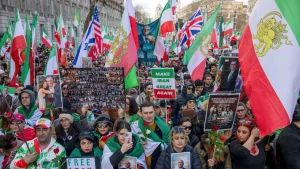Growing Rift: US-Latin American Relations Under Strain Following Caribbean Interventions
Diplomatic Tensions Escalate Across Hemispheric Relationships
The diplomatic landscape across the Americas has grown increasingly fraught in recent months, with long-standing alliances facing unprecedented strain following a series of controversial U.S. military operations in the Caribbean region. What began as targeted interventions has evolved into a significant diplomatic crisis, revealing deep fissures in hemispheric relations that threaten decades of regional cooperation. The ongoing feuds between Washington and several Latin American capitals reflect broader concerns about sovereignty, security partnerships, and the future direction of inter-American relations in an increasingly multipolar world.
The tensions first became apparent following U.S. military actions in the Caribbean that caught many regional partners by surprise. These operations, which U.S. officials characterized as necessary security measures to address emerging threats, were met with immediate criticism from governments across Central and South America. Leaders from countries including Mexico, Brazil, and Argentina issued unusually sharp rebukes, questioning both the legality and strategic wisdom of the interventions. “We cannot accept unilateral actions that violate international law and regional sovereignty,” declared one South American president during an emergency meeting of the Organization of American States (OAS). The diplomatic fallout has been swift and consequential, with several nations recalling their ambassadors from Washington for consultations – a rare and significant gesture in hemispheric diplomacy that signals serious displeasure with U.S. policy direction.
Perhaps most alarming for regional stability has been the deterioration in relations between the United States and Colombia, historically one of Washington’s closest allies in Latin America. The Trump administration’s decision to substantially reduce aid to Colombia earlier this year had already created tensions in the bilateral relationship. Colombia has long been the largest recipient of U.S. security assistance in the hemisphere, with billions invested in counter-narcotics operations, military training, and rural development initiatives. The aid reduction came at a particularly sensitive moment for Colombia, which continues to implement a complex peace process while confronting persistent security challenges. “This reduction in support could not have come at a worse time,” explained a senior Colombian diplomat speaking on condition of anonymity. “We are working to consolidate peace in territories long abandoned by the state, and this requires sustained international partnership.” The subsequent Caribbean interventions only exacerbated Colombian concerns about U.S. reliability as a partner, with President Duque taking the unprecedented step of publicly questioning U.S. strategy in a region Colombia considers vital to its own national security interests.
Regional Security Cooperation at Risk as Trust Erodes
The diplomatic tensions have raised serious questions about the future of regional security cooperation, long a cornerstone of inter-American relations. Several ongoing multinational initiatives now face uncertain futures, including joint counter-narcotics operations, intelligence sharing networks, and coordinated responses to transnational criminal organizations. Military exercises scheduled for later this year have been postponed indefinitely, and several countries have declined to participate in U.S.-led security forums. “We’re witnessing a fundamental reassessment of security partnerships across the region,” noted Dr. Maria Fernandez, director of the Center for Hemispheric Security Studies at the University of Buenos Aires. “Countries that have traditionally aligned with Washington on security matters are now questioning whether their interests are truly aligned with current U.S. policy approaches.” This erosion of trust comes at a particularly challenging moment, as the region confronts complex transnational threats that experts agree require coordinated international responses.
The economic implications of these tensions cannot be overstated. Trade relationships worth hundreds of billions of dollars annually now face potential disruption as diplomatic relations deteriorate. The uncertainty has already affected investment flows, with several major infrastructure projects involving U.S. companies now under review in multiple countries. Currency markets have shown volatility in response to the diplomatic crises, with several Latin American currencies experiencing significant fluctuations. “Investors hate this kind of uncertainty,” explained Carlos Gutierrez, former U.S. Commerce Secretary and current chairman of a global business advisory firm. “When you have this level of tension between natural economic partners, it inevitably affects business confidence and investment decisions.” The timing is particularly problematic as many Latin American economies work to recover from pandemic-related contractions, with several countries experiencing sluggish growth and persistent unemployment.
Shifting Geopolitical Landscape Creates New Alignments
Perhaps most concerning for long-term U.S. interests in the region is the opportunity these tensions create for strategic competitors. Both China and Russia have moved quickly to capitalize on the diplomatic rift, with Beijing announcing new infrastructure investments and Moscow expanding security cooperation offers to traditional U.S. partners. A high-level Chinese trade delegation recently completed a tour of five South American capitals, signing preliminary agreements worth billions in sectors including energy, transportation, and telecommunications. Meanwhile, Russian defense officials have proposed expanded military training programs and preferential arms sales to countries that have traditionally sourced military equipment from the United States. “Nature abhors a vacuum, and geopolitics is no different,” observed former U.S. Ambassador to the OAS Tom Shannon. “When the United States creates distance between itself and its natural partners in this hemisphere, other global powers will inevitably seek to fill that space.”
The humanitarian dimensions of this diplomatic crisis add another layer of complexity. The reduction in U.S. aid to Colombia has direct implications for vulnerable populations, including millions of internally displaced Colombians and Venezuelan refugees who have fled to Colombia in recent years. Similar concerns exist throughout the region, where U.S. assistance programs support essential services in healthcare, education, and food security. “When diplomatic relationships deteriorate, it’s often the most vulnerable who suffer the consequences,” warned Carolina Martinez, regional director for a major international humanitarian organization. “We’re concerned that political tensions could translate into reduced support for critical human needs at a time when communities are already struggling.” Regional migration experts have also expressed concern that deteriorating economic conditions could trigger new waves of irregular migration toward the United States – ironically exacerbating one of the very issues that has been a priority for the Trump administration.
Path Forward Requires Diplomatic Reset and Renewed Engagement
Diplomatic analysts emphasize that resolving these tensions will require more than rhetorical adjustments. “We need a fundamental recalibration of how the United States engages with its hemispheric neighbors,” argued Richard Feinberg, former Latin America director on the National Security Council. “This means genuine consultation before major security actions, respect for sovereignty concerns, and recognition that effective partnerships must be based on mutual interests, not unilateral demands.” Some hopeful signs have emerged in recent weeks, with back-channel diplomatic efforts reportedly underway to address the most serious points of contention. Several former U.S. officials with deep regional expertise have been enlisted to help repair damaged relationships, working quietly with counterparts across Latin America to identify potential pathways toward reconciliation.
The stakes could not be higher for hemispheric relations. The Americas face unprecedented shared challenges that transcend borders – from climate change to organized crime, migration crises to pandemic recovery. Addressing these complex issues effectively requires coordinated action and mutual trust, precisely the qualities that have been undermined by recent tensions. “History tells us that the Americas prosper when we work together as respectful partners,” reflected Luis Almagro, Secretary General of the OAS. “The alternative – a fragmented hemisphere where cooperation is replaced by competition and suspicion – serves no one’s interests.” As diplomatic efforts continue to address the immediate crisis, the broader question remains whether the United States and its Latin American neighbors can forge a new approach to regional relations – one that acknowledges the changed geopolitical realities of the 21st century while preserving the core values and interests that have historically united the Americas.











